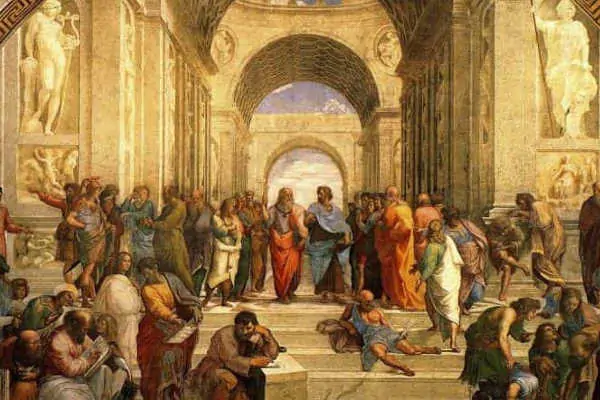The Linguistic Landscape of Ancient Rome: Unraveling the Languages
What Language Did Rome Speak?
The Roman Empire was a sprawling entity that spanned continents and cultures, resulting in a complex linguistic landscape. At its core, Latin was the official language of Rome, shaping administration, literature, and culture. But the Empire’s multilingualism was a defining feature, with Greek and various regional languages playing crucial roles. Understanding these languages not only illuminates the administrative and cultural practices of Ancient Rome but also offers insight into the legacy that endures in modern languages.
Latin: The Cornerstone of Roman Culture
Latin was more than just the language of the Romans; it was the foundation of Roman identity and governance. As the official language of the Roman Empire, Latin permeated all facets of public life.
Historical Background of Latin
Latin originated in the Italian peninsula, specifically in the region known as Latium. It was initially spoken by the early Romans and gradually evolved as the Roman Republic expanded into the Roman Empire. Its development can be categorized into several phases:
- Old Latin (circa 6th century BCE): The earliest form of Latin, used in inscriptions and some literary texts.
- Classical Latin (circa 75 BCE to 200 CE): The refined language of Roman literature and formal communication.
- Vulgar Latin (circa 3rd to 7th century CE): The colloquial form spoken by the common people, which eventually evolved into the Romance languages.
Latin as the Administrative and Literary Language
Latin was the bedrock of Roman administration. It was used in legal documents, governmental proceedings, and official decrees. Prominent Roman authors like Cicero, Virgil, and Ovid utilized Latin to craft works that would shape Western literature and thought. The language’s precision and flexibility made it ideal for recording and codifying Roman laws and scholarly work.
Influence on Modern Languages

The influence of Latin is profound and far-reaching. Latin is the progenitor of the Romance languages: Spanish, French, Italian, Portuguese, and Romanian. Furthermore, Latin remains the lingua franca in scientific, medical, and legal terminology. Its structure and vocabulary continue to impact these disciplines, showcasing its enduring legacy.
The Evolution of Latin: Classical vs. Vulgar
Latin did not remain static but evolved over time, leading to variations that reflected different social strata and regions.
Differences Between Classical and Vulgar Latin
Classical Latin was the formal, literary language used by educated Romans and found in works of literature, rhetoric, and oratory. It was characterized by its strict adherence to grammatical rules and complex sentence structures.
In contrast, Vulgar Latin was the everyday speech of the common people. It exhibited a more relaxed grammar and vocabulary, often influenced by local languages and dialects. Vulgar Latin’s evolution is responsible for the divergence of the Romance languages from their Latin roots.
Impact on Regional Dialects and Languages
Vulgar Latin gradually morphed into regional dialects, eventually becoming the distinct Romance languages. This transformation was influenced by factors such as geography, local customs, and contact with other cultures. The spread of the Roman Empire facilitated this linguistic diversification, leading to a rich tapestry of languages across Europe and beyond.
Greek: The Language of Education and Science
:max_bytes(150000):strip_icc()/marble-plates-with-an-inscription-in-latin-916389698-5c397ff8c9e77c000128b95e.jpg)
While Latin was dominant, Greek held a prestigious position in Roman society, especially in the realms of education, science, and philosophy.
Greek Influence in Roman Education and Science
Greek was the language of many of the Roman Empire’s greatest scholars and educators. Greek texts were central to education, particularly in the study of philosophy, science, and medicine. Prominent Greek philosophers such as Plato and Aristotle were highly revered, and their works were extensively studied by Roman scholars.
The Role of Greek in Literature and Philosophy
Greek literature and philosophy had a profound impact on Roman intellectual life. Roman authors often engaged with Greek texts, adapting and translating them into Latin. This cultural exchange enriched Roman literature and thought, blending Greek and Roman traditions.
Etruscan and Other Regional Languages
Beyond Latin and Greek, the Roman Empire was home to a variety of regional languages, each contributing to the Empire’s cultural diversity.
Overview of the Etruscan Language
The Etruscan language was spoken by the Etruscan civilization, which preceded Roman dominance in Italy. Although not related to Latin, Etruscan had a significant impact on Roman culture, particularly in religious and ceremonial contexts. The Etruscans influenced Roman architecture, religious practices, and even aspects of the Latin language.
Brief Discussion on Other Regional Languages
Other regional languages included Oscan and Umbrian, spoken by the Italic tribes in central and southern Italy. These languages, while less influential than Latin or Greek, played a role in the regional identity and cultural practices of their speakers.
The Role of Multilingualism in Roman Society
Multilingualism was an integral aspect of Roman society, reflecting its diverse and expansive nature.
Languages in the Military and Administration
The Roman military was a melting pot of languages. Soldiers from various regions of the Empire communicated in a mix of Latin, Greek, and local languages. This linguistic diversity facilitated administration and coordination across the Empire, allowing for effective governance and military operations.
The Impact of Conquest and Trade
Roman conquests and trade further contributed to the Empire’s linguistic variety. As the Romans expanded their territories, they encountered and absorbed new languages and cultures. Trade routes facilitated the exchange of languages and ideas, enriching the Roman linguistic landscape.
Latin’s Legacy in Modern Languages

The legacy of Latin is evident in the modern world, particularly in the languages and terminologies that have evolved from it.
Latin’s Influence on Romance Languages
Latin’s influence is most apparent in the Romance languages, which evolved directly from Vulgar Latin. These languages share a common grammatical structure and vocabulary derived from Latin. Understanding Latin provides insight into the origins of these languages and their development.
Latin’s Role in Scientific and Legal Terminology
Latin remains a crucial component of scientific and legal terminology. Many technical terms are derived from Latin, reflecting its role as a language of precision and formality. For example, in biology, Latin is used to classify species, and in law, Latin phrases often appear in legal texts and principles.
Preservation of Ancient Languages through Manuscripts
The preservation of ancient languages relies heavily on manuscripts that have survived through the centuries.
The Role of Manuscripts in Preserving Ancient Languages
Manuscripts, whether inscribed on stone, papyrus, or parchment, serve as crucial records of ancient languages. They provide valuable insights into the language, culture, and history of the Roman Empire. Key texts, such as those by Cicero and Virgil, have been preserved and studied, offering a window into Roman life and thought.
Examples of Preserved Texts and Their Importance
Several significant texts have survived, including the works of Roman poets, historians, and philosophers. These texts not only preserve the Latin language but also offer a glimpse into Roman society, politics, and intellectual pursuits. Examples include Cicero’s speeches, Virgil’s Aeneid, and the historical writings of Livy.
Main Characters’ Biographies
| Character | Role | Significance |
|---|---|---|
| Cicero | Roman Orator and Philosopher | Major contributor to Latin literature and philosophy. |
| Virgil | Roman Poet | Author of the Aeneid, a key work of Latin literature. |
| Ovid | Roman Poet | Known for his elegiac poetry and influence on later literature. |
| Plato | Greek Philosopher | His works influenced Roman thought and education. |
| Aristotle | Greek Philosopher | His writings were central to Roman intellectual life. |
Meta Description: Discover the languages of Ancient Rome, including Latin, Greek, and regional dialects. Learn about their influence on modern languages and cultures.
References:
- History Defined: What Were the Languages of Ancient Rome?
https://www.historydefined.net/what-were-the-languages-of-ancient-rome/






